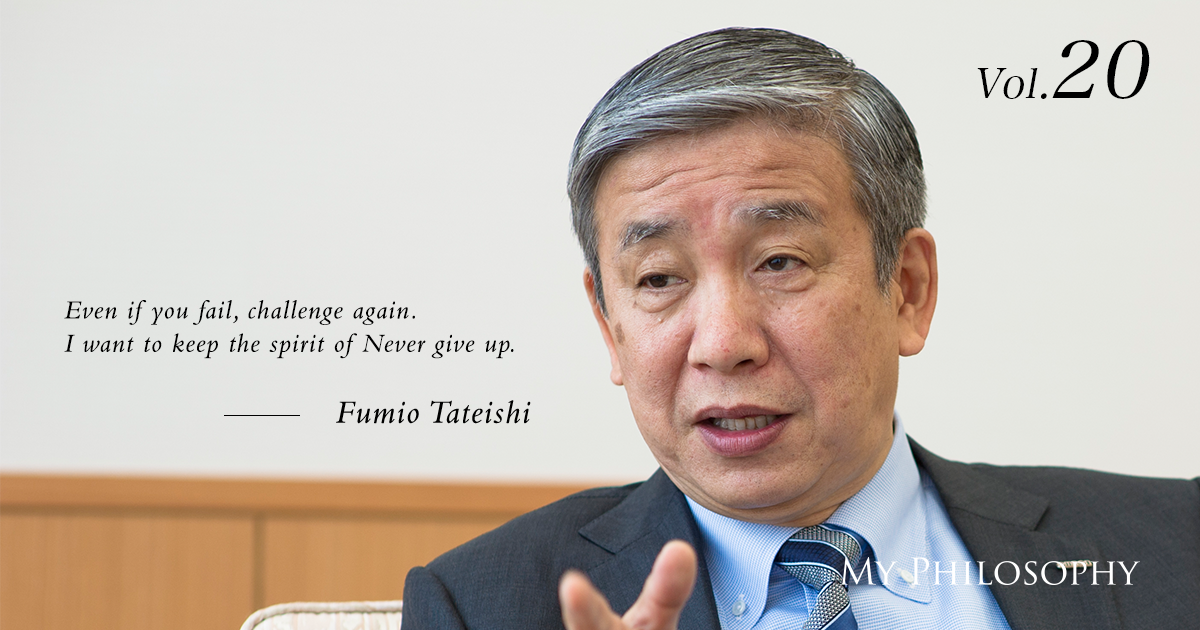
As a founding member, Mr. Fumio Tateishi has walked alongside the growth of OMRON Corporation. Currently serving as the Chairman, Mr. Tateishi spends his days busily. We had the opportunity to speak with him about his journey so far, as well as the social significance of OMRON.
Profile
Vol.20 Fumio Tateishi
Chairman of the Board of Directors, OMRON Corporation
Fumio Tateishi graduated from the Faculty of Business and Commerce at Keio University in 1972. He joined Tateishi Electric Co., Ltd. (now OMRON Corporation) in 1975. In 1997, he became a member of the board of directors and spent four years in Europe managing European subsidiaries. In 1999, he was appointed as an Executive Managing Director. In 2001, he assumed the role of Director of the Corporate Strategy Office for the entire group. In 2003, he became the Executive Vice President and President of the Industrial Automation Business Company. He was appointed Vice Chairman of the Board in 2008 and Chairman of the Board in 2013. He completed his doctoral course in the Graduate School of Engineering at Tohoku University in 2011 and earned a Ph.D. in Engineering.
*The titles and positions mentioned are as of September 2013, when the interview was conducted.
Raised freely as the youngest child, yet shaped by older siblings
In the latter half of my junior year in college, I started job hunting just like my classmates. I am the youngest of five brothers and two sisters, and my eldest brother, as well as the second and third ones, had been supporting our father from an early age. I had no intention of joining them. My father was strict with discipline, but he said nothing about my career path. He even allowed me to attend Keio University, which was not in our local area of Kyoto. The decision to go to Keio was sparked by the Keio Gijuku Wagner Society Male Choir. It happened during a summer trip to Hakone. At the poolside, four elderly men were performing a beautiful chorus. It was so splendid that I approached them, and they turned out to be alumni of the Keio Gijuku Wagner Society Male Choir. I was strongly motivated to sing like them, and my desire to join the Wagner Society was actually stronger than my desire to attend Keio itself.
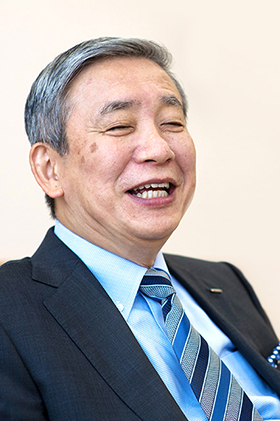
As a result of my job hunting, I received an offer from a company, but during the final health examination, I was diagnosed with tuberculosis and had to reluctantly decline the offer. I then spent three years in recuperation. My father trusted Eastern medicine over Western medicine, so from a young age, I was made to eat raw vegetables, drink persimmon leaf tea, and take alternating hot and cold baths—a practice known as contrast hydrotherapy. I spent a year and a half at a health dojo (training center), another year at the Kyoto University Tuberculosis Research Institute, and another half year recuperating at home. While at the institute, I had a lot of time to think about life and even obtained a real estate transaction specialist qualification. This serious illness made me bolder, or rather, the world seemed less frightening. Eventually, I joined Tateishi Electric Co., Ltd. at the age of 25, three years later than my peers.
Since joining the company, I believe I have walked alongside our employees in my own way. I entered the management side for the second time in June 2008, but until then, I was on the executive side, facing various conflicts in fulfilling my mission to make the company more vibrant and a happier place for employees to work. My current role as Chairman involves external representation duties such as spreading our corporate philosophy on a global scale, promoting CSR, and participating in business community activities. Therefore, I am careful about what I say publicly. I’m nervous about this interview as well (laughs).
The Corporate Philosophy as a Centripetal Force
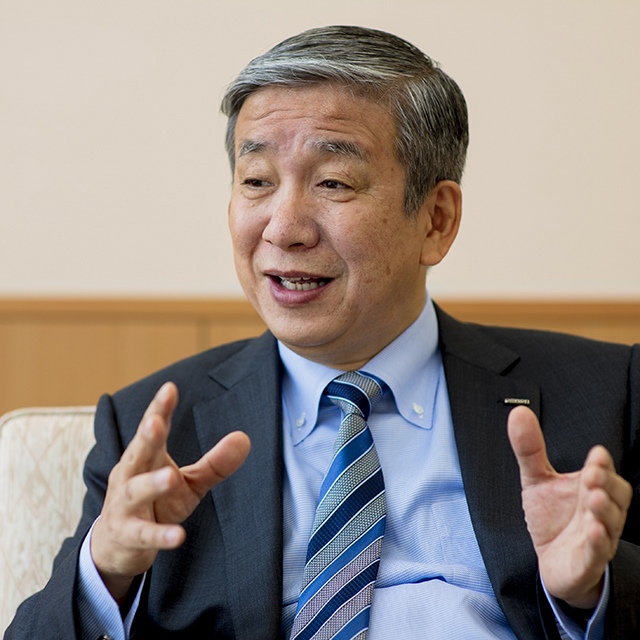
Since 2006, Omron has likened its corporate philosophy to the sun, serving as a centripetal force. The stronger the sun, the further its light reaches, meaning the corporate philosophy permeates every corner of the organization. Until then, the company had centered around its founder as the centripetal force. However, with the appointment of the first president from outside the founding family in 2003, and with two-thirds of the employees being from overseas, most of whom were from generations unfamiliar with the founder, it became difficult to maintain the founder as the focal point. Consequently, on May 10, 2006, the anniversary of the company’s founding, we renewed our corporate philosophy. To ensure its global penetration, we published a booklet on the corporate philosophy in 25 languages. Including myself, who was the vice-chairman at the time, the management team engaged in dialogues with employees on the ground about how they understand and embody the corporate philosophy, a practice we have continued ever since. Abroad, we hold annual discussions called “Corporate Philosophy Dialogues,” centered around local executives, to discuss the corporate philosophy. If only the centrifugal force of business expansion intensifies, the organization could end up directionless, like a balloon cut from its string. A strong centripetal force ensures that all employees are aligned and moving forward as one.
Because we always place the corporate philosophy at the heart of our efforts, we have created a system where management can seamlessly connect from the executive level to the operational ground level. Following the Lehman shock and the IT bubble burst, management visited the ground level to engage in discussions about the future direction, enabling employees to understand the situation of the company and to give their best from their respective positions. Therefore, we were able to smoothly achieve a U-shaped recovery even amidst global economic uncertainties.
The Existence of Omron: “Through our efforts, let us enhance our lives and create a better society.”
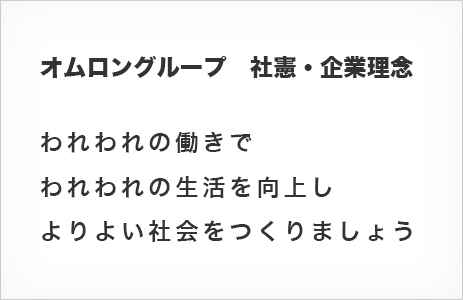
At Omron, we equate our business with CSR (Corporate Social Responsibility). Whether Omron can continue to exist depends on whether we can solve the social issues of the countries and regions we operate in. Solving the social issues of a country or region is the creation of social needs, and without this, Omron has no reason to exist. The social significance of Omron lies in our ability to provide solutions to social issues and to make the lives of those living in those societies better. The approach to addressing social issues varies with the maturity of the market, and Omron considers what we can do for each issue and how we can approach our corporate social responsibility, aiming to contribute in a way that suits each society.
From this perspective, our fundamental corporate philosophy is that “the corporation is a public instrument of society.” To make this philosophy more understandable, we have established a corporate constitution that states, “Through our efforts, let us enhance our lives and create a better society,” and placed it on plaques in each department. We also declare this externally by including it on our business cards. This practice is not limited to Japan but is followed overseas as well.
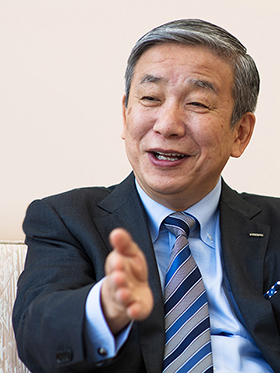 Travel teaches tolerance
Travel teaches tolerance
My personal motto is “Ichi-go ichi-e,” which I interpret as treating each day, each encounter, as if it will never recur in one’s lifetime. Additionally, “Travel teaches tolerance.” Essentially, this means go and travel. When you travel globally, encounter different cultures, and learn about the local people’s ways of life and thought processes, these experiences eventually return to you as tolerance. I believe it’s important for young people to travel. Indeed, traveling is beneficial. Expanding one’s knowledge and increasing tolerance are necessary aspects of being human.
I also like the phrase “Never give up.” I’m a bit embarrassed to say that I earned a doctoral degree in engineering two years ago. This, too, might be an instance of “Never give up,” a lifetime commitment to learning, perhaps. It embodies the spirit of perseverance, of not giving up no matter how many times you fail. Having worked at Omron with this mindset, perhaps that’s why I challenged myself to obtain a degree. Truly, if you’re determined to find a way, you will find it.
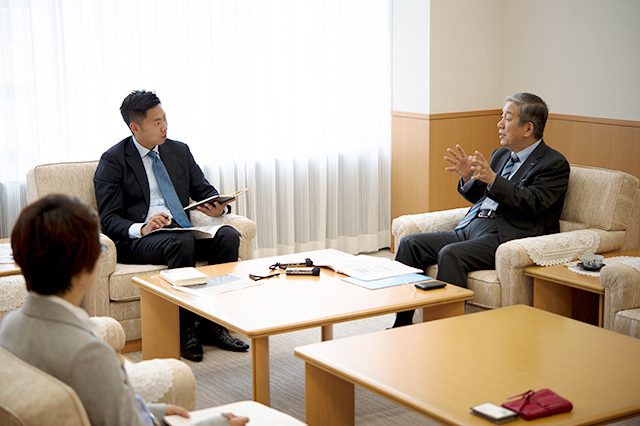
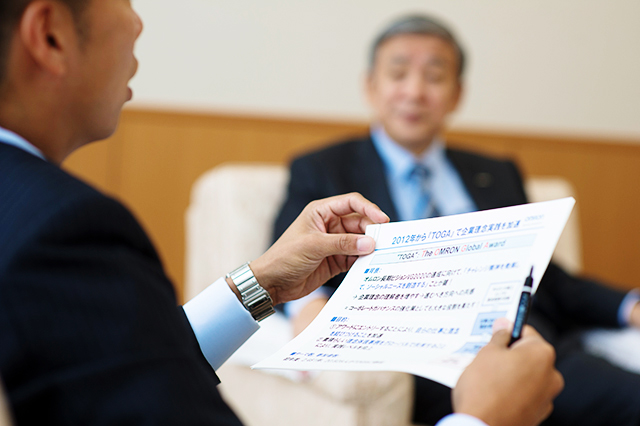

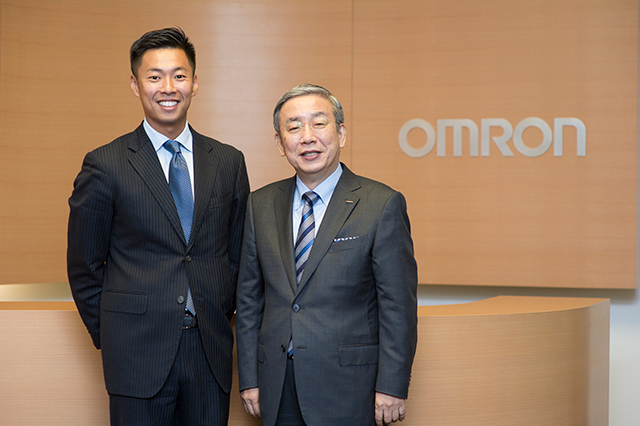
My first encounter with DK dates back to about 15 years ago when he was a freshman in college. I’ve had the opportunity to meet him several times recently. Each time we meet, I can sense that DK’s “capacity” as a person has grown. For instance, if he knows he’s going to meet me, my guess is that he prepares by thoroughly researching recent topics related to me, incorporating knowledge into our discussions. However, on the day we meet, although it seems like DK is asserting himself, he does so without creating a heavy atmosphere, elevating our conversation to a light-hearted discussion.
Observing DK recently, he personally went to Manila with relief supplies for the emergency support of the Philippines typhoon that occurred in November 2013. He embodies the willingness to provide support and contribute as much as possible within his means, the consciousness to want to make people happy, and the action to make it happen. I feel a deep sense of empathy for his way of life and am one of those who want to send him my encouragement.
Fumio Tateishi, Chairman of the Board of Directors, Omron Corporation
Starting in 2007, “My Philosophy” has now reached its 20th edition. I am very pleased that for this memorable edition, we were able to conduct an interview with Mr. Fumio Tateishi, Chairman of the Board of Directors of Omron Corporation, coinciding with the 80th anniversary of the company.
Mr. Fumio Tateishi is, in a word, like the sun. I felt his heart is wide and his capacity is large. With great affection, he cherishes the company, employees, society, and his family. There are many stories in the interview that I would like to learn from, and I have resolved to become a tolerant adult.
“The company has no reason to exist if it does not serve society.” I completely agree with this sentiment. It’s essential for individuals and companies to consider how they can be useful. The “spirit of serving the public”advocated by the late Hiroshi Kato, Professor Emeritus at Keio University, is indispensable for managers. The spirit of independence and self-respect is what Japan needs now, along with a strong heart to know oneself and carve out one’s life.
September 2013, at Omron Corporation, Edited by Naomi Kusuda, Photographed by Daiki Ayuzawa





























































































































